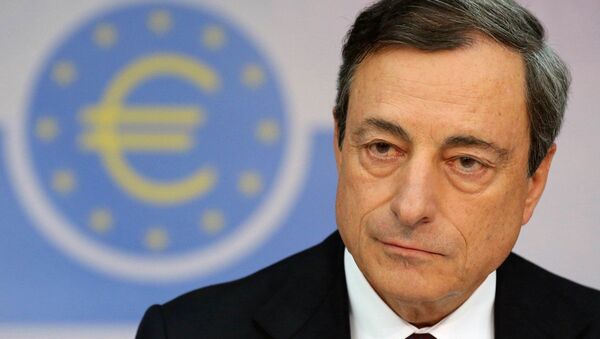MOSCOW, November 18 (Sputnik) — The recession in Japan and opening of the Stock Connect scheme between Hong Kong and mainland China have sparked uncertainty in Asian-Pacific currency trading, while in Europe the looming European Central Bank (ECB) easing pushed the euro down and the US dollar stays unchanged along with most commodities down on sluggish growth prospects.
ECB President Mario Draghi confirmed yesterday his commitment to expand Eurozone stimulus in case the current ECB measures prove inadequate to accelerate growth and overcome the looming deflation in Europe. According to a Reuters report, the new ECB easing measures may include bonds purchase, which is similar to the recently-ended US Federal Reserve’s quantitative easing (QE) programme.
“If necessary to further address risks of too prolonged a period of low inflation, the governing council is unanimous in its commitment to using additional unconventional instruments within its mandate,” Mr. Draghi said as quoted by the Wall Street Journal.
Such unconventional measures will increase the volumes of available euro liquidity, a move that will negatively impact on its FX rate. Investors sold the euro yesterday, opting to accumulate dollars as the US Fed intends to hike interest rate next year, guaranteing the dollar FX rate will go up.
The euro was down by 0.2% to $1.2487 compared to a 2.5-week high of $1.258 the previous day. The US dollar remained unchanged against yen despite the recession news, as two opposite trends collided on Japan’s markets: the recession news pushed the yen higher, but as the markets anticipated further easing, there was equalizing downward pressure was leveraged on the yen. As a result, the dollar cost 116.605 yen, down from a seven-year high of 117.06 yesterday morning.
The Australian dollar is strengthening on the investment money influx in the country. The looming Asia-Pacific trading and investment liberalization only adds to this optimistic sentiment. The Aussie dollar rose 0.1% against the greenback to 0.8719.
"I see a risk for the AUD/USD to be squeezed higher because of capital flows into Australia," Greg Gibbs of Royal Bank of Scotland Singapore branch said as quoted by Reuters.
As for the commodities, the shock recession news from Japan drove most of them down, with gold sliping to $1,188.20, down from 2.5-week high of $1,193.95 yesterday. A barrel of Brent crude trades at $79.01, down 0.38%.
The Russian rouble rose against the dollar with the latter trading at 46.8445 RUB, down by 0.75%, while the euro trades at 59.3 RUB, amid the continued effect of the international sanctions and falling crude prices. Russian stock markets are moving flat with the RTS adding 0.12% and the MMVB edging up by 0.42%.

